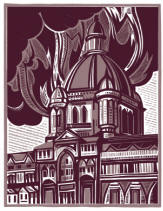|
RELIGION
IN THE NEWS |
|
|
Quick Links: Articles in this issue:
From the Editor:
Downplaying Religion |
As of now, the Mumbai bombings are being blamed on the militant Pakistani organization Lashkar-e Tayyiba together with possible Indian co-conspirators, although the organization has denied responsibility. Because much of the reporting and policy work on the activities and networks of the Lashkar is based on hearsay and conjecture, it remains a rather shadowy group. As far as we can tell, it is the armed wing of Markaz al-Dawa al-Irshad, an Islamic political organization headed by Hafiz Muhammad Saeed, a former professor at the University of Engineering Technology, Lahore. Originally formed in Kunar, Afghanistan in 1989 or 1990 to fight alongside the Taliban, Lashkar is currently based in Muridke in Punjab, Pakistan, in a compound said to have been largely financed by Saudi Arabia. According to the International Crisis Group, the group operates in Indian Kashmir and has training camps in Punjab and along the Line of Control in Pakistani Kashmir. Lashkar produces several publications: Voice of Islam (English), Al-Ribat (Arabic), Majallah al-Dawa (Urdu), a women’s publication Tayyibat (Urdu), a youth publication Zarb-e-Taiba (Urdu), and the weekly Jihad Times (Urdu and Sindhi). It also had a web-based radio and website, which are now shut down. After the Mumbai assault, foreign journalists were granted open access to various parts of the Muridke compound, which houses schools and seminaries for both men and women, farms, mosques, fish-breeding ponds, carpentry workshops, and stables. Like many organizations of its ilk, Lashkar runs charity, medical, and social service organizations, and was a major player in reconstruction and relief efforts after the 2005 Kashmir earthquake. The organization’s express agenda is the liberation of Muslims in Jammu and Kashmir from Indian army occupation, but its ideology is distinctly Wahabi. In a pamphlet entitled “Why are we waging jihad?,” the group calls for restoration of Muslim rule over India. Hafiz Saeed is scathing in his criticism of Israel and the United States, and has threatened to launch attacks on American interests. Although Lashkar has not been linked with domestic sectarian violence, it has connections to militant anti-Shia groups. In 2001, the U.S. government included Lashkar on its Terrorist Exclusion List and designated it as a Foreign Terrorist Organization. That same year, the organization was also banned in Britain. The government of Pakistani President Musharraf banned it in 2002, upon which it morphed into a charity organization called Jamat al-Dawa. In 2003, the Pakistani government put this new organization on the terrorist watch list. After the Mumbai bombings, the United Nations too has sanctioned its four top leaders, designating them as terrorists subject to an assets freeze, travel ban, and arms embargo. The policy community contends that groups like Lashkar are receiving material and moral support from the Pakistani military and intelligence agencies. While quite probable, the links remain obscure. The attitude of the Pakistani state is complicated by Lashkar’s multi-purpose nature as a service, charity, and educational organization and by the fact that most Pakistanis believe in a legitimate Kashmiri struggle against Indian occupation. While Lashkar has a recorded history of militancy, the group (and by association, Pakistan and its intelligence agencies) has also tended to be the fall guy for all terrorist operations in India. It claimed responsibility for attacks on the Red Fort army barracks in Delhi (2000), Srinagar airport (2001), and Indian border security forces (2002). It denied responsibility for the 2001 Indian Parliament bombing, 2006 attack on Mumbai’s commuter rail, and the recent bombings. However, several key incidents in which the Lashkar was accused, including the Malegaon blasts and the 2007 attack on the Samjhauta Express, have recently been connected to Hindu extremist groups. |
